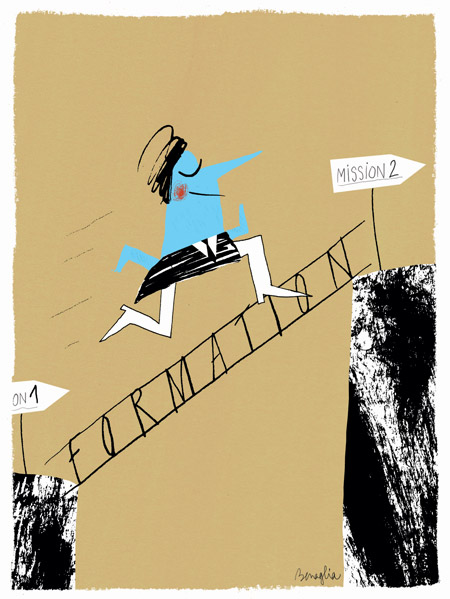
Illustration by Frederic Benaglia
In a career spanning more than 30 years, David Rowe, Ph.D., has served higher education as a trustee, president, and vice president for advancement; today he helps boards and institutional leaders develop strategies to lead in a disruptive educational landscape. A consultant with the In Trust Center and the Association of Governing Boards for Universities and Colleges (AGB), Rowe spoke with In Trust’s Matt Hufman about current times in education and the evolving role of governance.
When you look at theological education, what do you think board or senior leaders need to know about the times we’re in right now?
There are three interconnected areas of significant change: membership, mission, and ministry. As membership has declined, we’ve seen churches begin to redefine their missions in terms of membership and to grapple with defining the mission when membership can’t be taken for granted. And if our mission as trustees and leaders of theological schools is to prepare ministers at a time when ministry is in flux and we’re not paying attention to how the church is changing, then we may be preparing professional ministers for a church that existed 50 years ago.
Or do we want to be a partner in helping the church redefine it? To me, wait-and-see means the role of theological education will diminish over time because we’re not helping shape the future; we’re actually serving the past.
Trying to create that for the larger church becomes a missional question. So talk a little bit about mission, what you see, and how you get to where you think we ought to be.
I think one of the challenges that we have as seminaries is at the governance level, where over the last two or three decades we’ve invited trustees onto the boards for basically one of three reasons. First, many schools are creatures of a particular denomination, so there’s a corporate relationship that requires representation on the board to retain connection to the denomination. Those kinds of connections often can be exercised as some form of softer control over the theological aspects of seminary life, ministry, and learning.
Second is for constituencies – people on the board that you want to bring influence into the institution and to exert influence among the stakeholders that they represent.
And third, we’ve brought people on the board for contributions – intellectual, experiential, or financial. That worked in a stable environment when the church had enough membership to support its mission, and ministry was not in flux. But when you have that kind of fixed understanding of the church, you have a fixed understanding of what the seminary is. And so you can have governance that is parsed out among people with the expectation that they would exert influence in these areas.
And then our enrollments decline, technology subverts instruction, and churches need fewer people trained as we have in the past. And we turn to these people who were there for control, constituencies, and contributions and say, “Wait, we’ve got a new job for you. The budget’s not balanced. We’ve got deferred maintenance.” So now there’s a new role for board members. The circumstances of higher education, and the circumstances of the church, have created an environment where the fiduciary responsibilities of board membership are now more front and center than they’ve ever been. In some ways we’ve done a bait-and-switch on them.

Illustration by Frederic Benaglia
What do you see as the new responsibilities for board members?
I think there are three dimensions: care, change, and conflict. If you’re the one brought on for control of constituent relations or contributions, you’re now charged with the entire spectrum of care for the institution – students, faculty, staff, and mission. It’s not that trustees didn’t care before; now the care has become more complicated.
The second thing is to contemplate and govern through change. When you have a relatively stable understanding of the church and higher education, there’s not a lot of need for transformative change. Before, trustees were invited to help shore up the stability of the institution; now we’re asking them to destabilize the institution so that they can better care for the mission.
The inevitable consequence of change is conflict: internal conflict of individual board members, conflict among board members, and almost certainly conflict among constituencies with vested interests and maybe vision. So, one important piece of governance is not to mitigate conflict, but to some extent tolerate the conflict and govern through it in a faith-informed way.
What changes do you see for the role of the president in this new environment?
The test for successful presidencies needs to shift from conflict-free to constructive conflict, in concert with stakeholders in the institution. If the presidents are not engaged in conflict, the first question that I would have is are they actually engaged in caring for the mission of the institution?
What does the future of governance look like?
Three dimensions: economics, humanism, and evolution. We’ve got to pay attention to economics because the coffers of the churches and the funders of the past are diminishing.
Second, the days of being defined as a particular denomination’s school are behind us. We should use opportunities for institutional integration to work toward Christian unity, even if it’s only pragmatic, such as sharing resources.
Finally, I think understanding that boards will be responsible for evolution. How do you continually evolve the church and not feel like that you’ve departed from the past and landed at the new normal? The new normal has got to be constantly unsettling itself so that there is some understanding of how the institution should evolve.
And so I’m thinking about this historic juncture. Institutions always have been challenged, with major disruptions that they’ve overcome. This is another one, and we need to bake into our DNA a new way of evolving – right alongside the church, helping to define what ministry, mission, and membership look like, and learning how we will effectively carry out God’s will in the world.